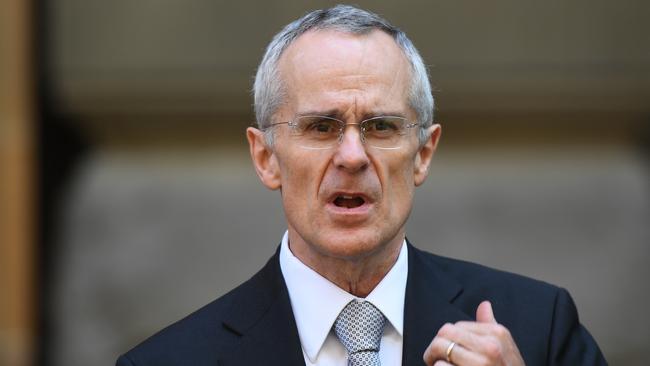No quick fix for power: ACCC
ACCC boss Rod Sims has warned there will be no quick fix for soaring energy prices, after a decade of policy failings.

Competition boss Rod Sims has warned there will be no “quick fixes” for soaring energy prices, with a decade of policy failings likely to take at least as long to repair.
Releasing an interim report on energy prices, Mr Sims said many of the factors driving a 63 per cent hike in costs such as high network charges were baked in and would take years before they fell.
The comments came as the government passed legislation to abolish an appeal process that the Australian Energy Regulator said had been gamed by the energy networks and added almost $11 billion to electricity costs since 2008.
In a report released yesterday, the Senate standing committee on environment and communications said the limited merits review had not fulfilled its purpose and was contributing to the increase in energy prices for consumers, and escalating costs for network operators.
“The abolition of limited merits review will ensure that regulatory regime is focused on the long-term interests of consumers and businesses and ensure an efficient and sustainable national energy market,” the government-majority committee said.
The move could affect billions in future revenue for Australia’s increasingly privately owned network assets with a range of local and interstate investors spending $35bn to snap up controlling interests in three NSW poles and wires operators, while The Australian’s DataRoom column yesterday revealed the Basslink interconnector linking Victoria and Tasmania is on the market.
The Senate committee found that instead of providing a mechanism for network companies to address regulatory errors and improve accountability, the limited merits review had become a routine part of the regulatory process, with appeals to the Australian Competition Tribunal contributing to outcomes that were not in consumers’ interest.
“In effect, the Tribunal is being used as a second regulator,” the committee found.
“This has resulted in a highly legalistic, complex and costly review process which acts as a barrier to the engagement of other stakeholders, such as consumer groups.”
The federal government moved to abolish the review at the request of the Australian Energy Regulator after a series of decisions aimed at cutting the amount of revenue networks could recover were overturned using the limited merits review.
Mr Frydenberg said rates of return for networks fell from more than 10 per cent between 2008 and 2010 to around 6 per cent.
Between 2006 and 2016, when demand was falling, the asset base for networks increased from $37bn to $84bn.
“A lower rate of return on such a big number is still a big number,” Mr Frydenberg said.
According to Energy Networks Australia, $11bn of grid infrastructure is used only about 1 per cent of the time, 4-5 days per year, but the costs are baked into revenue allowances.
It is the latest in a series of moves by the federal government to reign in soaring energy bills, including threatened restrictions on exports of gas, a $2bn upgrade of the Snowy Mountains Hydro scheme, the Finkel review on the future reliability, affordability and environmental impact of the energy market and inquiries into retail pricing by the ACCC and the Productivity Commission.
But Mr Sims said there would be no quick fixes for energy prices, with pressure on retailers to improve standing offers to consumers the quickest route.
“It has been 10 years in the making and it is going to take 10 years to fix," Mr Sims said.
The AER welcomed the abolition of the limited merits review, saying it had long believed that the mechanism hurt consumers.
“In a time when energy affordability is major concern for Australian households and businesses, the abolition of the limited merits review means consumers can be reassured that AER decisions mean they are paying no more than they should for safe and reliable power,” an AER spokesman said.
“The AER has observed and welcomes greater co-operation between network businesses and consumer groups during their engagement with the regulator since the commonwealth government announced its intention to remove limited merits review in July this year.
“Such a co-operative approach benefits all stakeholders as it drives mutually agreeable outcomes. The AER will be working to nurture this approach in the post-LMR environment.”
Andrew Dillon, interim chief executive of peak body Energy Networks Australia said the ACCC report had highlighted that network costs had peaked and were now falling.
Privately operated networks have protested previously that they are far more efficient than the government-owned networks in NSW and Queensland that drove the “gold-plating” of poles and wires that added tens of billions of dollars to the asset base on which their returns are driven.
“… energy networks have a strong interest in Australia having a high-quality regulatory regimen to ensure users pay no more than necessary.”




To join the conversation, please log in. Don't have an account? Register
Join the conversation, you are commenting as Logout